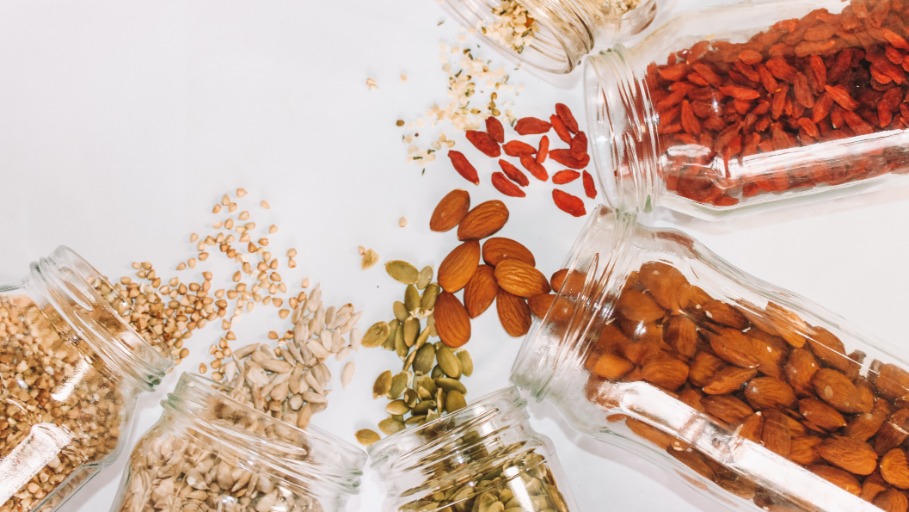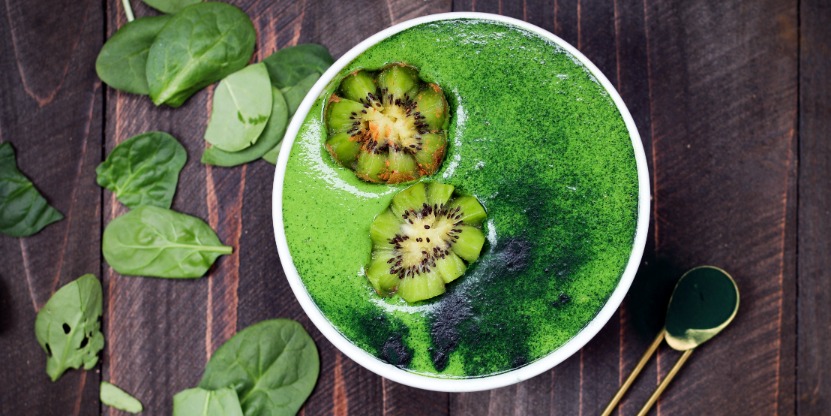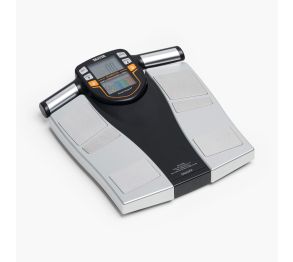Vegan diet muscle gain: The 10 best plant based protein sources


It is often said that building muscle mass is difficult in combination with a vegan diet. This is said to be due to a protein deficiency within this plant-based diet. But nothing could be further from the truth. By eating a varied diet and getting enough plant-based proteins, muscle gain is certainly not impossible for vegans.
Do you want to achieve maximum muscle gain with a vegan diet? In this blog we will list for you the best plant based proteins to build and maintain your muscle mass.
Why are proteins important for muscle building?
Proteins are needed to recover your strained muscles after an intensive workout. All workouts, strength training, and even intensive yoga put a strain on your muscles, resulting in cracks. Proteins ensure that these cracks recover faster and increase your muscle mass.
Fitness experts often recommend eating products such as cottage cheese, eggs, meat and fish to create muscle mass. However, there are also many vegan athletes who have achieved success without these animal products, like yoga instructor Michelle Muench and bodybuilder Jon Venus.
Plant based protein sources for muscle gain
Protein is indispensable if you are training hard and want to grow muscle mass. To get enough of it with a vegan diet, you can choose the following plant-based proteins for muscle gain:
1. Spirulina
Spirulina is a blue-green algae and king among proteins. It has a very high protein concentration of 70%. This means it contains more protein than meat and dairy. Spirulina powder can easily be added to a smoothie or dish or you can take supplements daily.
2. Seeds and kernels
Hemp seeds, pumpkin seeds, sesame and chia seeds contain about 20 to 30 grams of protein per 100g. You won't eat a handful of these, of course, but make your own seeds/kernels mix and sprinkle them over a bowl of coconut yoghurt or salad for an extra bite. Or mix them through your smoothie for an extra dose of protein.


3. Peanut butter
It is not only healthy, but also tasty and rich in protein. Peanut butter contains about 25g of protein per 100g. In general, most types of peanut butter are vegan.
4. Nutritional yeast
Not unknown among vegans: nutritional yeast flakes. It looks like dry sawdust, but this form of yeast has a cheese flavour that could be used as a substitute for grated cheese. Sprinkle a tablespoon (10 g) of these flakes on top of your pasta and you will have 5 grams of vegan protein in it.
5. Nuts and peanuts
These vegan proteins are not to be missed. Peanuts contain most proteins at 26 g per 100 g. Almonds, pistachio, and cashew nuts are also good options. Eat them as a snack or add them to a vegetarian curry, for example.
6. Beans and Legumes
Beans and legumes are often mentioned as good substitutes, but be careful which one you choose. Soy beans, kidney beans, split peas, mung beans, lentils and chickpeas are among the winners and are good for 20 to 25 g of protein per 100 g. In addition to protein, beans and legumes also contain a lot of fibre that is effective in reducing visceral fat. Try some homemade bean burgers or eat a bowl of steamed edamame as a snack after your workout.
7. Porridge oats
Oatmeal is a perfect breakfast or post-workout meal to consume protein. It contains about 13 grams of protein per 100 grams and is easy to combine with other vegan proteins. Add soy milk (good for 7 g protein), a spoonful of peanut butter, a handful of nuts and some blueberries and you’ve created your own protein booster.
8. Tofu and tempeh
These meat substitutes both contain 12g of protein per 100g and are very versatile. For example, you can use them for all kinds of stir-fry dishes, curries and salads, or eat them loosely fried next to a portion of vegetables and rice.
9. Vegetables
Fresh (green) vegetables do not contain as much protein as the options mentioned above, but they should not be missing with your meal. If you are looking for the most protein-rich vegetables, then opt for these:
- Artichokes - 3.3 g protein per 100 g
- Asparagus - 2.2 g protein per 100 g
- Cauliflower - 1.9 g protein per 100 g
10. Vegan protein powder
If you feel you need an extra boost in addition to these plant-based products, try one of the many vegan protein shakes that are available nowadays.
Nutrition tips for muscle gain as a vegan
- Make sure you get enough calories - To increase muscle mass, you need to get more calories than your body needs. Of course, choose healthy calorie-rich options such as avocado and nuts. With a body analysis scale you can measure your BMR: this measurement shows the minimum amount of calories your body needs.
- Eat enough protein - Eat enough protein during the day and divide it between meals and snacks. After exercise it is good to eat at least 20 grams of protein and research has shown that muscle protein production is maximally stimulated at an intake of 20 grams.
- Eat a varied diet to get essential amino acids - Amino acids ensure the storage and transport of various nutrients (such as fat, water and carbohydrates) in your body. In addition to protein, you also need the 9 essential amino acids for optimal muscle building. These types of amino acid are not produced by your own body and so need to be in your diet. Amino acids are mainly found in protein-rich products, but not in all of them, so make sure you eat a varied vegan diet to get all 9 amino acids from it.
- Eat enough fat - Fat provides more calories as carbs and protein, which is important to take in enough calories.
Monitor your muscle gain during your vegan diet
Do you want to keep track of whether your training and eating plant proteins is successful for your muscle building? A Tanita body composition scale (such as the BC-401), gives you measurements of your muscle mass, fat percentage, basal metabolism and more. With the accompanying My Tanita App you can easily keep track of your process and set goals for your muscle building.
If your goal is to strengthen the muscle mass specifically in your legs or core, and you want to measure the muscle building in this specific area, you can also opt for a segmental body composition scale, such as the BC-545n. Our segmental scales allow you to measure the effect of your training and nutrition in more detail. In addition to the ‘standard measurements’, the device also gives you accurate measurements of your muscle mass and fat percentage per arm, leg and your central abdominal area.




